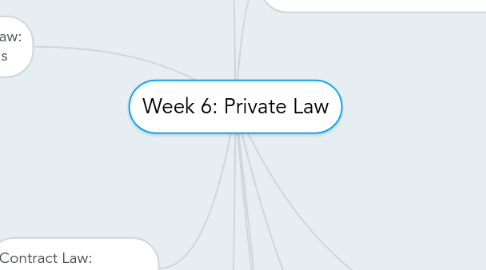
1. Contract Law: Obligations
1.1. Legal relationship between two (bilateral) or more (multilateral) persons.
1.2. What happens when the obligation is not performed?
1.2.1. Remedies!
1.2.2. Non-enforceable obligations (Art. 6:3 BW)
1.3. How to terminate an obligation?
1.3.1. Performance
1.3.2. Remission of debt
1.3.3. Confusion
1.3.4. Force majeure
2. Contract Law: Freedom of Contracts
2.1. Freedom in choice of formal requirements
2.2. Freedom in choice of contract partner(s)
2.3. Freedom in choice of obligations
2.4. Freedom regarding other materials
2.5. Limitations (Art. 3:40 BW)
2.5.1. Statutory provisions
2.5.2. Public morality
2.5.3. Public order
3. Contract Law: Requirements for a valid contract
3.1. Capacity (Art. 3:32 BW)
3.2. Permissible content (Art. 3:40 BW)
3.3. Consensus (Art. 6:217 jo. 3:33 BW)
3.4. Determinability of obligations (Art. 6:227 BW)
4. Contract Law: Mistake when concluding contract
4.1. Will ≠ statement
4.2. No statement, no consensus (Art. 3:33 BW)
4.3. Unless: the other party had no doubt about the mistake (Art. 3:35 BW)
5. Tort Law: Cellar Hatch case
5.1. Degree of probability
5.2. Degree of likelihood
5.3. Gravity of the consequences
5.4. Burden of adequate precautions
6. Tort Law: An unlawful act (Art. 6:162(1) BW)
6.1. Unlawful factual act
6.1.1. Violation of someone else's right
6.1.2. Violation of a statutory duty
6.1.3. Improper social conduct (general duties of care)
6.2. Attribution
6.2.1. fault-based liability: blame is on actor
6.2.2. strict liability: blame is irrelevant; risk
6.2.2.1. parents of children < 14 y.o. (Artt. 6:164 jo. 6:169(1) BW)
6.2.2.2. possessor of a building/animal (Art. 6:176/6:179 BW)
6.2.2.3. parents of children > 14 y.o. but < 16 y.o. (Art. 6:169(2) BW)
6.2.2.4. employers (Art. 6:170 BW)
6.3. Causality
6.3.1. 'but for' test
6.3.2. theory of adequate causation (reasonably foreseeable conditions)
6.3.3. reasonability (foreseeability, nature of liability, damage)
6.4. Obligation
6.4.1. material damage (Art. 6:96 BW)
6.4.2. immaterial damage (Art. 6:106 BW)
6.5. Limitation: no protection offered Art. 6:163 BW
7. Contract Law: Vitiated consent
7.1. If the will was not fulfilled after the contract was concluded, consent is defective = annulment of contract
7.2. Error (Art. 6:228 BW)
7.3. Fraud (Art. 3:44 BW)
7.4. Threat (Art. 3:44(2) BW)
7.5. Abuse of circumstances (Art. 3:44(4) BW)
8. Contract Law: Breach of Contract & Performance Problems
8.1. Inferior performance
8.2. Late performance
8.3. Non-performance
9. Contract Law: Remedies
9.1. Invoke right to suspend own performance (Art. 6:262 BW)
9.2. Claiming specific performance (Art. 3:296 BW)
9.3. Claiming damages (Art. 6:74 BW)
9.3.1. Force majeure (Art. 6:75 BW)
9.3.2. Second chance if performance still possible (Art. 6:82 BW)
9.4. Terminate contract (Art. 6:265 BW)
9.4.1. Performance still possible? (Art. 6:265(2) BW)
9.4.2. No retractive effect (Art. 6:271 BW)

